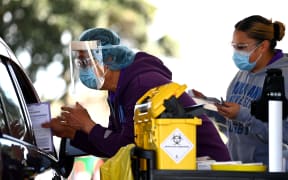
Photo: 123RF / AFP / RNZ
The new coalition government's inquiry into the pandemic response risks undermining the authority of the ongoing Royal Commission, a legal expert warns.
The independent inquiry was a key demand of the New Zealand First Party, which has promised to compensate people who lost their jobs due to the mandates or suffered vaccine injuries.
Under the coalition agreement between the National Party and New Zealand First, the government commits to:
- End all Covid-19 vaccine mandates still in operation.
- Ensure, as a matter of urgency in establishment and completion, a full scale, wide ranging,
- Independent inquiry conducted publicly with local and international experts, into how the Covid pandemic was handled in New Zealand, including covering:
o Use of multiple lockdowns,
o Vaccine procurement and efficacy,
o The social and economic impacts on both regional and national levels, and
o Whether the decisions made, and steps taken, where justified.
The incoming Prime Minister Christopher Luxon said the aim was to "broaden the terms of the Covid inquiry so it considers more things, and broaden the terms of reference".
"So it's going to consider a range of topics, social as well as environmental as well."
Professor Alexander Gillespie from Waikato University's school of law said it would preferable to widen the scope of the current Royal Commission of Inquiry rather than setting up a separate body.
"You don't want to to get into this position in which you start undercutting Royal Commissions either. You need to treat them with the respect they deserve, the integrity of their processes and the work that they undertake.
"But if you're going to start putting another inquiry effectively on top of the Royal Commission, that's not a good look."
Royal Commissions already had "the highest powers to investigate", Professor Gillespie said.
"The smarter way to do it would be to wait until they've made their findings [in September 2024] and then if they need to augment, give them more questions to look at, give them more issues to debate. But don't undercut them before they've made their findings."
Otago University epidemiologist Professor Michael Baker said he had "complete confidence" in the Royal Commission to do what it was meant to do, which was to assess New Zealand's pandemic response to see what could be done better in future.
"It is a very forward-looking inquiry by highly competent commissioners with broad terms of reference."
It was "not unreasonable" to include questions around the vaccine, he said.
"Was it worth while? Did it make a difference? Did it perform well? These are reasonable questions to look at. We know that nothing is 100 percent effective or 100 percent safe.
"My reading of the evidence is the vaccine clearly saved thousands of lives in New Zealand but there were three or four deaths from myocarditis, which is obviously a tragedy for those people's friends and families.
"But the relative benefits hugely exceeded those deaths."
New Zealand did not need an inquiry on the same scale as in Britain, he said.
"The UK government managed the pandemic appallingly. They had more than 120,000 deaths, many of them avoidable, and people are quite rightly very angry and are demanding answers.
"That inquiry is going to take five or six years and cost millions of pounds, it's very litigious, presided over by judges with lots of lawyers involved.
"New Zealand's experience was quite different - our response was one of the best in the world in terms of health outcome, less time under lockdowns and disruption to the economy."
Professor Baker, who advised government agencies during the pandemic and has given evidence to the Royal Commission, said there was no doubt it would find "some things could have been done better".
"And that's exactly what we need to look at, because there will be a next time.
"There are scenarios that are far worse than Covid 19 on the horizon unfortunately, and we do need to be prepared for them."







